Eco-resort
[edit] Introduction
Eco-resort is a relatively loose term that describes a type of tourist accommodation designed to have the minimum possible impact on the natural environment in which it is situated. The definition by its nature has been relatively open to interpretation as are its associated building specific terms such as eco-retreat, eco-lodge, eco-hotel and indeed the term describing the umbrella industry as a whole - eco-tourism.
[edit] United Nations World Tourism Organization
Whilst the United Nations World Tourism Organization (UNWTO) does not refer building-specific terms, it does refer more generally to eco-tourism in relation to protected areas and defines a number of characteristics of ecotourism:
- All nature-based forms of tourism in which the main motivation of the tourists is the observation and appreciation of nature as well as the traditional cultures prevailing in natural areas.
- It contains educational and interpretation features.
- It is generally, but not exclusively organised by specialised tour operators for small groups.
- Service provider partners at the destinations tend to be small, locally owned businesses.
- It minimises negative impacts upon the natural and socio-cultural environment.
- It supports the maintenance of natural areas which are used as ecotourism attractions by:
- Generating economic benefits for host communities, organisations and authorities managing natural areas with conservation purposes;
- Providing alternative employment and income opportunities for local communities;
- Increasing awareness towards the conservation of natural and cultural assets, both amoung locals and tourists.
Whilst a variety of well know environmental labels for buildings, such as LEED, BREEAM, PassivHaus, Green Star, Well etc do not exclude holiday resorts or hotels per se there are a growing number of green labels that specifically cater for eco-resorts and eco-tourism, some of these are described below.
Ref https://www.unwto.org/sustainable-development/ecotourism-and-protected-areas
[edit] The Global Sustainable Tourism Council (GSTC)
The Global Sustainable Tourism Council (GSTC) - is arranged in four pillars: (A) Sustainable management; (B)Socio-economic impacts; (C) Cultural impacts; and (D) Environmental impacts. It is designed to be adapted to local conditions and supplemented by additional criteria for the specific location and activity, because tourism destinations have their own culture, environment, customs, and laws.
Ref https://www.gstcouncil.org
[edit] Biosphere Tourism
Biosphere Tourism Partner is a management and positioning system for a destination, company, or tourism product, through accompaniment and advice on continuous improvement. The Biosphere Methodology translates Sustainable Development Goals (SDGs) to the tourism industry. The certification gives a long-term balance between the economic, socio-cultural, and environmental dimensions of a destination, reporting benefits for the entity itself, society, and the environment and are GSTC approved.
Ref https://www.biospheretourism.com/en
[edit] EarthCheck
EarthCheck is the world’s leading scientific and environmental benchmarking, certification and advisory group for the travel and tourism industry. For over 30 years, they have worked with leading research centres and universities around the world to address the main sustainability and climate change issues facing tourism destinations, communities, and enterprises.
[edit] Eco Resort Network
Eco Resort Network is an international group of professional journalists and event organisers, that have created a niche in the field of experiential hospitality.working in the eco resort and glamping sectors to share ideas, experiences, advice and best practice.
ref https://blog.ecohotels.com/the-most-reliable-eco-labels-in-the-hotel-industry-of-2021/
[edit] The Global Ecovillage Network
The Global Ecovillage Network (GEN) catalyses communities for a regenerative world. GEN is a growing network of regenerative communities and initiatives that bridge cultures, countries, and continents. GEN builds bridges between policy-makers, governments, NGOs, academics, entrepreneurs, activists, community networks and ecologically-minded individuals across the globe in order to develop strategies for a global transition to resilient communities and cultures.
An ecovillage is an intentional, traditional or urban community that is consciously designing its pathway through locally owned, participatory processes, and aiming to address the Ecovillage principles in the 4 areas of regeneration (social, culture, ecology, economy) into a whole systems design. Ecovillages are living laboratories pioneering beautiful alternatives and innovative solutions. They are rural or urban settlements with vibrant social structures, vastly diverse, yet united in their actions towards low-impact, high-quality lifestyles.
Ref https://ecovillage.org/about/about-gen/
[edit] Green Key
Green Key is a voluntary eco-label for hotels, hostels, campsites, holiday parks, small accommodations as well as conference centres, attractions, and restaurants. It is based on compliance with strict criteria in the areas of environmental management (water conservation, energy efficiency, waste management, cleaning, etc.) and sustainability education of (staff, guests, suppliers, etc.). The award is valid for one year and compliance is confirmed through an application process and on-site audits. Managed by the Foundation for Environmental Education, it is endorsed by UNWTO with more than 3,200 establishments recognised in 60 countries.
Ref https://www.greenkey.global
[edit] Green Globe Certification
The Green Globe Standard originated almost 30 years ago. It has 44 criteria and 385 indicators, depending on business types. It is a structured assessment programme for the sustainability performance of travel and tourism businesses and is active in harmonising with other established sustainability certification programmes around the world. The process of harmonisation contributes to maintaining core criteria and at the same time addresses regional issues through the adoption of locally developed standards.
Ref https://www.greenglobe.com
[edit] Travel Life
Travelife is an internationally recognised accommodation sustainability programme, developed in 2007 in response to a growing global understanding that businesses need to take a more proactive role in operating responsibly to address climate change and conservation. The Travellife certificate contains a range of criteria that assess accommodation performance in the areas of human rights and health, labour practices, community engagement, and environmental impacts, such as energy efficiency, as well as water and waste management. A global team of independent auditors visits every property to conduct an audit against the Travelife Standard.
Ref https://www.travelife.info
[edit] The Good Travel Seal / Programme
The Good Travel Seal is a certification programme for sustainability, health, and virus-awareness, introduced by the Good Travel Guide as a response to COVID-19, in 2020. It is specially created to serve small, family-run enterprises and offers a simplified version of the GSTC Standard, tailor-made for B&Bs, small hotels, hostels and guesthouses, and prepares medium-sized hotels for GSTC-Recognised certification. It has a Virus-Aware Seal to enable businesses to be certified for observing all measures against COVID-10 and other virus contamination. Reporting is transparent and consists of 57 general criteria from 12 subjects. Experts evaluate how many of the criteria were achieved and this is publicly available through a scorecard in the Good Travel Guide (pilot Bonaire).
Ref https://www.goodtravelprogram.com/index_new.php?menu=home_gts&lang=en
[edit] The Green Star Hotel
The Green Star Hotel (GSH) is a national green certification and capacity-building programme managed by the Egyptian Hotel Association (EHA) under the patronage of the Egyptian Ministry of Tourism. It offers the opportunity for hotels operating in Egypt to be internationally recognised for raising environmental performance and social standards while reducing operational costs. A team of certified local and international experts guides interested hotels through a sequence of training and information support sessions leading to field audits to ensure compliance with the standards prior to granting the GSH certification.
Ref https://www.greenstarhotel.org
[edit] The Green Sign
The GreenSign sustainability seal is awarded by the InfraCert Institute for Sustainable Development in the Hotel Industry. The certification is practical, specially developed for the hotel industry, and based on standards in accordance with EMAS and DIN ISO 14001. It structures, evaluates, and documents ecological, social, and economic aspects of hotel management in over 90 criteria. The hotelier is given the opportunity to further expand sustainability activities and to efficiently optimise operating processes. In Germany, GreenSign is the market leader as a sustainability seal for hotels and is now established internationally with over 250 certified hotels in 14 countries.
[edit] Related articles on Designing Buildings
- City networks.
- Hotel
- Leadership in Energy and Environmental Design.
- PHribbon tool calculates embodied carbon of designs.
- Sustainability.
- Sustainable communities
- Sustainable development
- Sustainable Development Goals and civil engineering
- Sustainable development toolkit
- Sustainable Living research project
- The sustainability of construction works
- The history of hotels
- Top Architectural Wonders of Dubai
- Passivhaus
- World’s 10 Best Treehouse Hotels
Featured articles and news
Microcosm of biodiversity in balconies and containers
How minor design adaptations for considerable biodiversity benefit.
CIOB student competitive construction challenge Ireland
Inspiring a new wave of Irish construction professionals.
Challenges of the net zero transition in Scotland
Skills shortage and ageing workforce hampering Scottish transition to net zero.
Private rental sector, living standards and fuel poverty
Report from the NRH in partnership with Impact on Urban Health.
.Cold chain condensing units market update
Tracking the evolution of commercial refrigeration unit markets.
Attending a conservation training course, personal account
The benefits of further learning for professsionals.
Restoring Alexander Pope's grotto
The only surviving part of his villa in Twickenham.
International Women's Day 8 March, 2025
Accelerating Action for For ALL Women and Girls: Rights. Equality. Empowerment.
Lack of construction careers advice threatens housing targets
CIOB warning on Government plans to accelerate housebuilding and development.
Shelter from the storm in Ukraine
Ukraine’s architects paving the path to recovery.
BSRIA market intelligence division key appointment
Lisa Wiltshire to lead rapidly growing Market Intelligence division.
A blueprint for construction’s sustainability efforts
Practical steps to achieve the United Nations Sustainable Development Goals.
Timber in Construction Roadmap
Ambitious plans from the Government to increase the use of timber in construction.
ECA digital series unveils road to net-zero.
Retrofit and Decarbonisation framework N9 launched
Aligned with LHCPG social value strategy and the Gold Standard.
Competence framework for sustainability
In the built environment launched by CIC and the Edge.
Institute of Roofing members welcomed into CIOB
IoR members transition to CIOB membership based on individual expertise and qualifications.
Join the Building Safety Linkedin group to stay up-to-date and join the debate.
Government responds to the final Grenfell Inquiry report
A with a brief summary with reactions to their response.













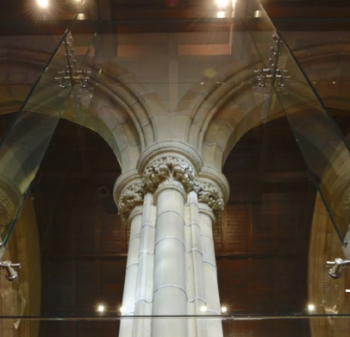

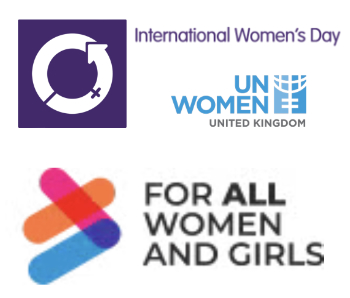



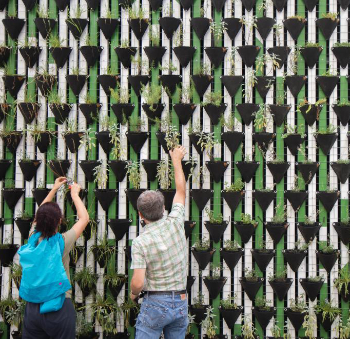


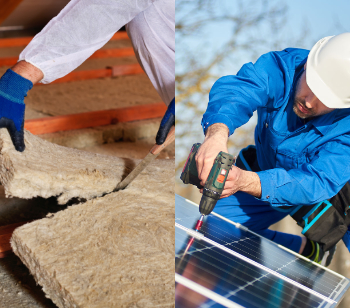
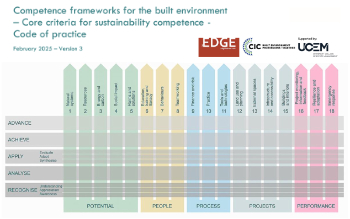


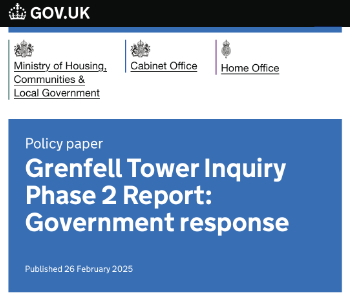
Comments
[edit] To make a comment about this article, click 'Add a comment' above. Separate your comments from any existing comments by inserting a horizontal line.